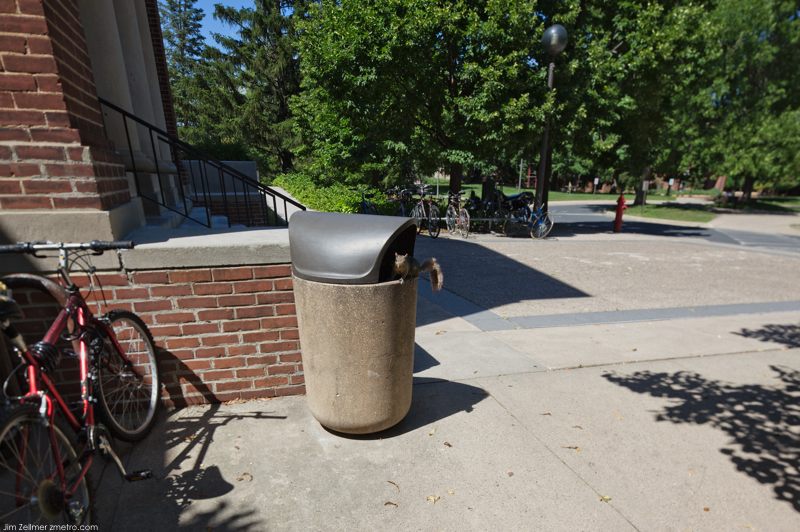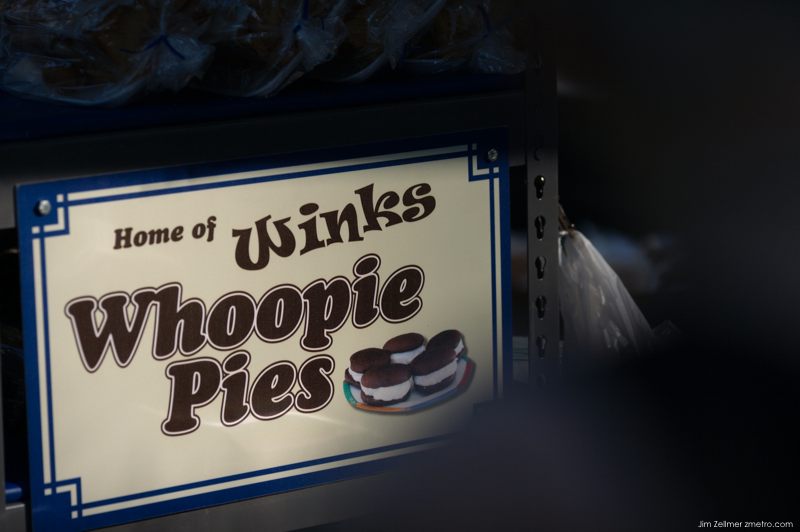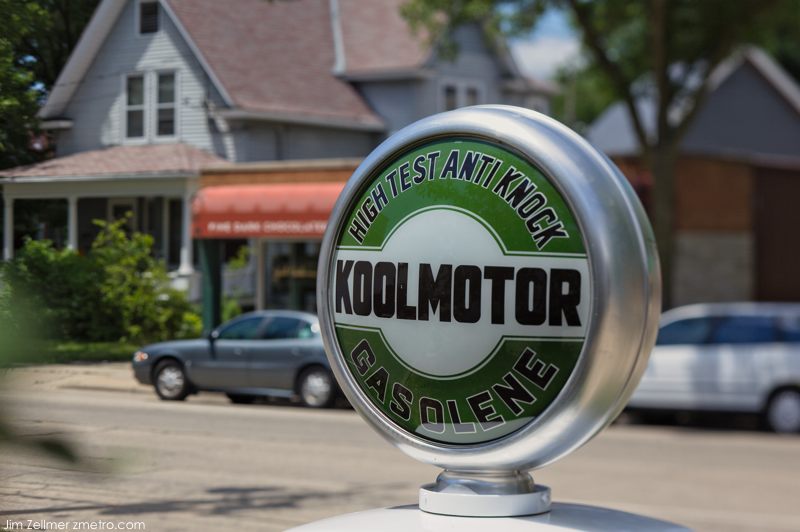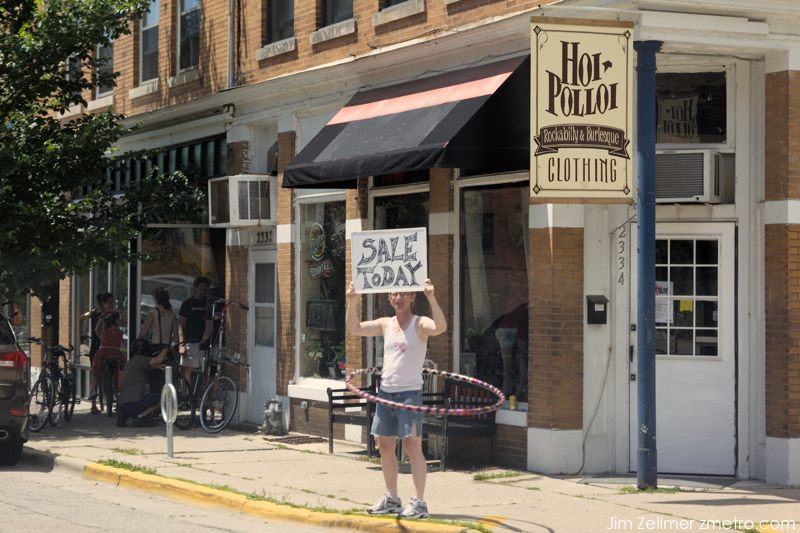
I believe this is a rather rare Shelby Cobra.
A sign of the times: “We will be glad to serve you when you are off your cell phone”.
KRLX
A squirrel seeking dinner
Malt O-Meal
Cooling off…
Dinner at Sea Salt Minneapolis
Art Fair on the Square Madison
Category: Culture
The Energy Future
The winter of 1979 in southern California reminded people why they had migrated to LA over the decades. The daytime temperatures were in the mid-70s, and the LA basin’s summer smog had disappeared, revealing the snowcapped San Gabriel Mountains.
At Neonex Leisure that day, we were brainstorming the recreational vehicle of the future. At the time we built America’s largest RV, the Arctic Sun, a combination van/pickup truck pulling a 55-foot-long 5th-wheel trailer. Now Neonex Canada had put our California division in charge of designing the company’s next Class A Motorhome.
Each of the other five U.S. managers gave their impressions of the future of the recreational vehicle, disclosing visions of startling grandeur. I was more flippant: “I bet it’s a Honda with a Coleman tent.” Three months later the Second Energy Crisis hit. We shut down our RV plant in two days flat, and I was back in Texas in five.
My point is that, if you had asked every energy or automotive issues guru what the future would hold for automobiles just before the winter of 1978 – 79, the answer would have been completely different if you’d asked them the same thing just 12 months later. That’s what an energy crisis can do.
My joke about a Honda with a Coleman tent was weirdly prophetic. But my fellow managers’ visions of million-dollar motorhomes would also turn out to be spot on — 20 years later.
Michael Hastings of Rolling Stone on the Story that Brought Down Gen. McChrystal and Exposed Widening Disputes Behind the U.S. Debacle in Afghanistan
In a rare extended interview, we speak to Michael Hastings, whose article in Rolling Stone magazine led to the firing of General Stanley McChrystal. Hastings’ piece quoted McChrystal and his aides making disparaging remarks about top administration officials, and exposed long-standing disagreements between civilian and military officials over the conduct of the war. The Senate confirmed General David Petraues as McChrystal’s replacement on Wednesday, one day after McChrystal announced his retirement from the military on Tuesday after a 34-year career.
Lunch with Luca Cordero di Montezemolo
Screaming down the home straight of Ferrari’s test track at 200kmph an hour in a classic red 458 Italia, I suddenly don’t feel like lunch. The Fiorano track near Bologna in central Italy is, at 3km, not long. But, partly in an attempt to impress the test driver next to me with some fast cornering, I feel as if I have left part of my stomach on one of its hairpin bends. Matters fail to improve as, in heavy fog untypical of early summer, I take the car off the track and, rather more slowly, on to the winding roads of the Apennines, heading for Ferrari HQ in nearby Maranello.
I am still spinning slightly when we pull into the car park just before the company’s elegant and aristocratic chairman, Luca Cordero di Montezemolo, who somewhat incongruously arrives in a small Fiat. He explains that his journey from Rome has been a nightmare as fog diverted his helicopter and forced him to take trains and cars – hence the Fiat. Nevertheless he appears in characteristically enthusiastic mood. “I’ve just been to a conference at the Vatican [on the financial crisis]. Fantastic,” he explains. “Fantastic” is a word Montezemolo uses a lot. Ferrari is “fantastic”, Italian food is “fantastic”, his new high-speed train company, NTV, is “fantastic”, as is the 458 Italia I have been driving.
On my way out he hands me a white postcard. “This is what I give to all new employees at Ferrari,” he says. Looking at it in a Ferrari 599 on the way back to Milan, it looks to me like the perfect credo for Montezemolo. It starts: “The real secret of success is enthusiasm. You can do anything if you have enthusiasm … With it there is accomplishment. Without it there are only alibis.”
Clusty Search: Luca Cordero di Montezemolo
A Beautiful Saturday








Three privacy initiatives from the Office of Management and BudgetThe U.S. government has a new take on federated identity, storage and social networks.
Last Friday was a scramble for government security personnel and independent privacy advocates, and should also have stood out to anyone concerned with the growth of online commerce, civic action, and social networking. The U.S. government’s Office of Management and Budget, which is the locus of President Obama’s drive toward transparency and open government, popped out three major initiatives that combine to potentially change the landscape for online identity and privacy, not only within government but across the Internet.
In this blog I’ll summarize the impacts of all three documents, as well as the next steps that I see necessary in these areas. The documents (all distributed as PDFs, which is not the easiest format to draw commentary) are:
- A discussion draft of the National Strategy for Trusted Identities in Cyberspace. Comments can be viewed and entered on a feedback site.
- An OMB Memorandum on Guidance for Online Use of Web Measurement and Customization Technologies.
- An OMB Memorandum on Guidance for Agency Use of Third-Party Websites and Applications.
These documents are not long, but the complexity of the policy areas they address ensure that no blog could cover everything of importance, nor could a single commentator like me provide a well-rounded view. I’ll focus on the changes they make to policies that are known to require change, with a “job well done” pat on the back. In highlighting gaps and omissions, I’ll deliberately swim around the shoals that others have loudly pointed to already, focusing instead on problems that I believe deserve more attention.
Vintage Trek Bike

Madison Saturday Zeitgeist….


“Forgotten Places” – Native American Mounds at Madison’s Elmside Park
iPhone / iPad and iPod users click here.
Worldwide Panorama is collecting panoramic scenes with the theme “Forgotten Places”. Nancy suggested Madison’s Elmside Park. Here it is.
From Native American Mounds in Madison and Dane County (A Madison Heritage Publication):
At the corner of Lakeland Avenue and Maple Avenue overlooking Lake Monona are two well-preserved Late Woodland animal effigies now referred to as a lynx and a bear. These mounds were originally part of a dense and extensive cluster of mounds that extended along the north shore of Lake Monona. Once part of the Simeon Mills farm, this site was still a favored Winnebago campground as late as the late 19th century. Most of the mound cluster, which included a bird effigy with a reported wingspan of 568 feet, was destroyed by turn-of-the-century residential development. Nearby, the beautiful sculpture, entitled “Let the Great Spirits Soar,” was carved by Harry Whitehorse, a Winnebago whose ancestors have lived in the Four Lakes area for hundreds of years. The sculpture was carved from a storm-damaged hackberry tree and honors his Indian ancestors and the effigy mound builders.
“The Time We Have is Growing Short”
If we need any further illustration of the potential threats to our own economy from uncontrolled borrowing, we have only to look to the struggle to maintain the common European currency, to rebalance the European economy, and to sustain the political cohesion of Europe. Amounts approaching a trillion dollars have been marshaled from national and international resources to deal with those challenges. Financing can buy time, but not indefinite time. The underlying hard fiscal and economic adjustments are necessary.
As we look to that European experience, let’s consider our own situation. We are not a small country highly vulnerable to speculative attack. In an uncertain world, our currency and credit are well established. But there are serious questions, most immediately about the sustainability of our commitment to growing entitlement programs. Looking only a little further ahead, there are even larger questions of critical importance for those of less advanced age than I. The need to achieve a consensus for effective action against global warming, for energy independence, and for protecting the environment is not going to go away. Are we really prepared to meet those problems, and the related fiscal implications? If not, today’s concerns may soon become tomorrow’s existential crises.
I referred at the start of these remarks to my sense five years ago of intractable problems, resisting solutions. Little has happened to allay my concerns. But, of course, it is not true that our economic problems are intractable beyond our ability to react, to make the necessary adjustments to more fully realize the enormous potential for improving our well-being. Permit me a note of optimism.
A few days ago, I spent a little time in Ireland. It’s a small country, with few resources and, to put it mildly, a troubled history. In the last twenty years, it took a great leap forward, escaping from its economic lethargy and its internal conflicts. Responding to the potential of free and open markets and the stable European currency, standards of living have bounded higher, close to the general European level. Instead of emigration, there has been an influx of workers from abroad.